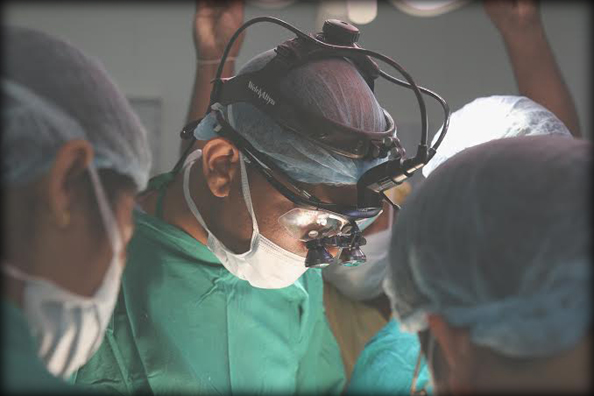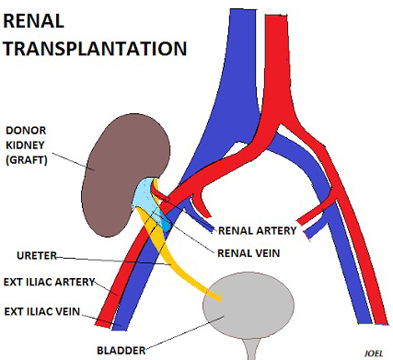When the kidneys fail
by Carol Aloysius
Kidney failure is one of the most difficult challenges faced by local
medical experts, battling to contain its spread, especially in the North
Central Province.
Already, the government has invested millions of rupees to treat
patients whose lives depend on renal replacement therapies such as
dialysis or transplant. Yet, with an average of 350-400 new kidney
patients reporting to hospitals in the North Central Province alone,
where the numbers of already affected patients are staggering, the
health budget is at bursting point.
What has caused this spread of kidney diseases in the country,
especially in the NCP in recent years, to the extent it is now regarded
as a national health problem by health authorities, compelling President
Maithripala Sirisena to set up a Kidney Disease Control Task Force?
|

The operating team, Consultant Nephrologist, Dr. Rajeewa
Dassanayake and Consultant Anaesthetists, Dr. Mahesh
Dharmakeerhi and Dr. Rasitha Wijewantha led by Dr. Joel
Arudchelvan performing the first transplant surgery at the
Polonnaruwa General Hospital |
While opinions vary and new theories continue to emerge, ongoing
research points strongly to two notable culprits: agro chemicals, which
farmers in this largely agricultural region use to eradicate pests and
weeds, toxic chemicals and hot metals from factory effluents . Both are
pollutants and harmful to human health if ingested or used for cooking.
A severe dearth of trained staff and lack of adequate dialysis units
and essential equipment has compounded the problems of the health
authorities in the NCP.
Here Dr Joel Arudchelvam, one of the leading kidney transplant
surgeons in the country, who has been responsible for 17 transplants in
the Anuradhapura Hospital in the past year alone, and just recently led
the first kidney transplant team at the Polonnaruwa General Hospital,
explains to the Sunday Observer about a disease, few people still do not
understand and why it causes our body organs to shut down.
Excerpts…
Q: Kidney disease is fast spreading in the island and is now a
significant health problem. Yet not many people know the kidneys play a
vital role in our body to the extent that their failure can cause it to
shut down. Many are not even aware where the kidneys are located in the
body. Tell us the functions of the kidney and where is it located in our
body?
A: The kidneys are organs that filter the blood and get rid of
many unwanted substances. There are two kidneys on each side at the back
of the abdominal cavity, just above the level of the waist.
Each is bean shaped and the size of a fist. A tube called the ureter
runs down from each kidney to the bladder. This is a muscular bag
situated in the pelvic. From the bladder a single tube, the ureter, runs
down the middle of the penis in the case of males and in females it
opens just above the vaginal opening. The kidneys have a good blood
supply and the blood gets filtered of waste products through the urine.
Q: So what makes them fail to function?
A: It could happen in recurrent and chronic infections of the
urinary tract or in other diseases like diabetes, nephritis and kidney
stones.
Q: How can the life of such a person be saved?
A: By attaching an artificial kidney (dialysis machine), which
filters toxic materials from the blood, or by transplanting a new
kidney.
Q: What is chronic kidney disease [CKD]?
A: CKD is a long term reduction in kidney function resulting
from kidney damage from various causes.
This results in symptoms and signs in patient and abnormalities in
blood tests.
Q: What is the most common kidney disease in Sri Lanka?
A: Causes for CKD varies depending on the age group. In
children, it is following glomerulonephritis and urinary tract
abnormalities, whereas in adults it is due to chronic glomerulonephritis
and a special form of kidney disease (Chronic Kidney Disease of unknown
etiology (CKDu)), which is prevalent in the North Central Province.
Other causes for CKD includes diabetes mellitus and hypertension.
Q: What is CKDu?
A: CKDu is a form of chronic kidney disease not attributable
to common causes mentioned above.
Q: Where do you find most patients with CKDu?
A: Most patients are found in certain parts of the North
Central Province (Medawachchiya, Padaviya, Kebitigolawa, and
Medirigiriya ), North Western Province (Nikawewa ),and parts of Uva
Province
Q: What causes CKDu?
A: As mentioned above the exact cause for CKDu is unknown. But
it is thought that water contamination with heavy metals like Arsenic
(As), Cadmium (Cd), and Lead (Pb) from agrochemicals and pesticides is
the cause. Genetically predisposed individuals are more affected.
 Q:
What is end stage renal failure (ESRF)? Q:
What is end stage renal failure (ESRF)?
A: This is a severe form of renal failure. Patients with ESRF
needs Renal Replacement Therapy (RRT) - either dialysis or renal
transplantation. Dialysis can clear some of the waste products from the
body but most of the other functions of the kidney cannot be performed
by dialysis. Besides, the patient also needs three sessions of dialysis
per week, each lasting four hours, which would cause a great deal of
inconvenience to him/her.
Q: So is renal transplantation a better option?
A: Transplantation basically means transferring tissues or
organs from one individual to another. In kidney transplantation the
kidney is taken from one individual (donor) and placed in a patient
(recipient) with end stage renal failure. The donor may be a living
individual (live donor) or a deceased individual (cadaveric donor). With
a new kidney graft, all the functions of the body will improve,
resulting in a better quality of life for the patient when compared to
dialysis.
Q: How is this procedure carried out?
A: In live donor renal transplantation, the first surgery we
perform is to remove the kidney (graft) from the donor (donor
nephrectomy). This can be done both laparoscopically (keyhole) and by
open surgery.
After taking out the donor kidney it is perfused with cold
preservative solution (HTK solution) and kept in ice box. Then the
recipient is taken. The kidney vessels are usually joined to iliac
vessels of the recipient (Refer figure) the ureter of the donor kidney
is connected to the recipient’s bladder.
Q: How many patients from the NCP where CKDu has the highest
prevalence, undergone kidney transplants in recent years?
A: In the North Central Province, since 2012, transplants have
been mainly done in the Teaching Hospital, Anuradhapura. Altogether 49
renal transplants have been done in the North Central Province so far
most of them are at the Anuradhapura Teaching Hospital.
Q: How many patients with kidney disease are awaiting surgery
in the NCP?
A: At present there are about 70 to 80 patients in the North
Central Province who need kidney transplantation . Till then their only
option is dialysis.
Q: How many dialysis units are there for the entire North
Central Province?
A: There are dialysis units at Anuradhapura, Polonnaruwa and
Padawiya Hospitals. However, the largest number of dialysis are done at
Anuradhapura.
Q: What are the main obstacles you face when performing a
kidney transplant operation?
A: One obstacle is the lack of trained staff. But the main
obstacle is the lack of donor kidneys. Getting a kidney from a live
donor, especially in an area where sometimes members of the same family
could be suffering from CKDu, and even people in the same area , is a
big problem.
Q: So what is your solution?
A: To solve this issue we should try to establish a deceased
donor program. The Ministry is trying to establish this in the future.
Q: Islandwide, how many hospitals have facilities for
transplant of kidneys? Are they adequate to serve the demand for this
life saving surgery?
A: At present renal transplantation is done at the National
Hospital Colombo, Maligawatte Hospital, Sri Jayawardenapura Hospital,
Kandy Teaching Hospital, Peradeniya Hospital, Karapitiya Teaching
Hospital, Anuradhapura Teaching Hospital, Polonnaruwa General Hospital,
as well as certain private hospitals.
Q: You had very recently led the operating team that did the
first ever kidney transplant at the Polonnaruwa General Hospital. Tell
us about that trail blazing surgery, the teething problems you faced,
and how you overcame them.
A: The patient, 35-year-old H.A. Lakshman Samankumara of
Unagalawekera Settlement Scheme, was suffering from Chronic Kidney
Disease of Unknown Aetiology (CKDu) . The donor was his 57-year -old
mother.
CKDu is very common in the North Central Province. Many of the
patients who were in an advanced stage of the disease required dialysis.
They go to the Anuradhapura Hospital until we decided to perform the
first transplant surgery at the Polonnaruwa hospital.
Being our first kidney transplant there, we had a few obstacles. We
didn’t have enough trained staff, so we had to borrow some of the
experienced staff for this operation.
We also lacked some of the needed instruments like the Special
Retraction for the recipient and vascular instruments. These too we
borrowed from the Anuradhapura Hospital. But despite these initial
hiccups, the operation itself has been a success and went off smoothly.
Q: Has the patient been discharged?
A: Yet both donor and recipient have been discharged. The
recipient is in good health. The serum creatinine which indicates the
clearing function of the kidney is normal. That means the creatinine is
functioning well and the kidney is functioning well and no complications
have developed..
Q:Will the patient need to be on medications?
A: It is natural the body will continue to try and reject the
new replacement. So he will have to be on anti-rejection medications for
life.
Q: Your message to patients?
A: If you live in a high risk area as in the NCP, and you
develop any suspicious symptoms such as what I have mentioned earlier,
get yourself checked out immediately by a qualified hospital
practitioner without delay. The earlier the detection the easier to
avoid complications. |

